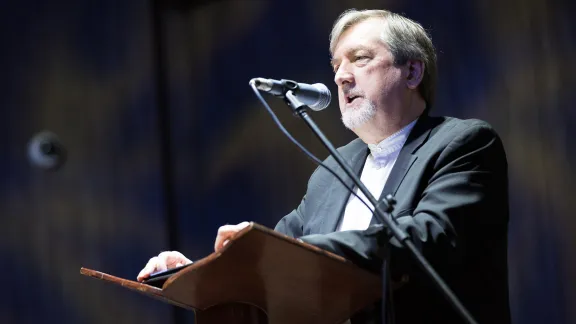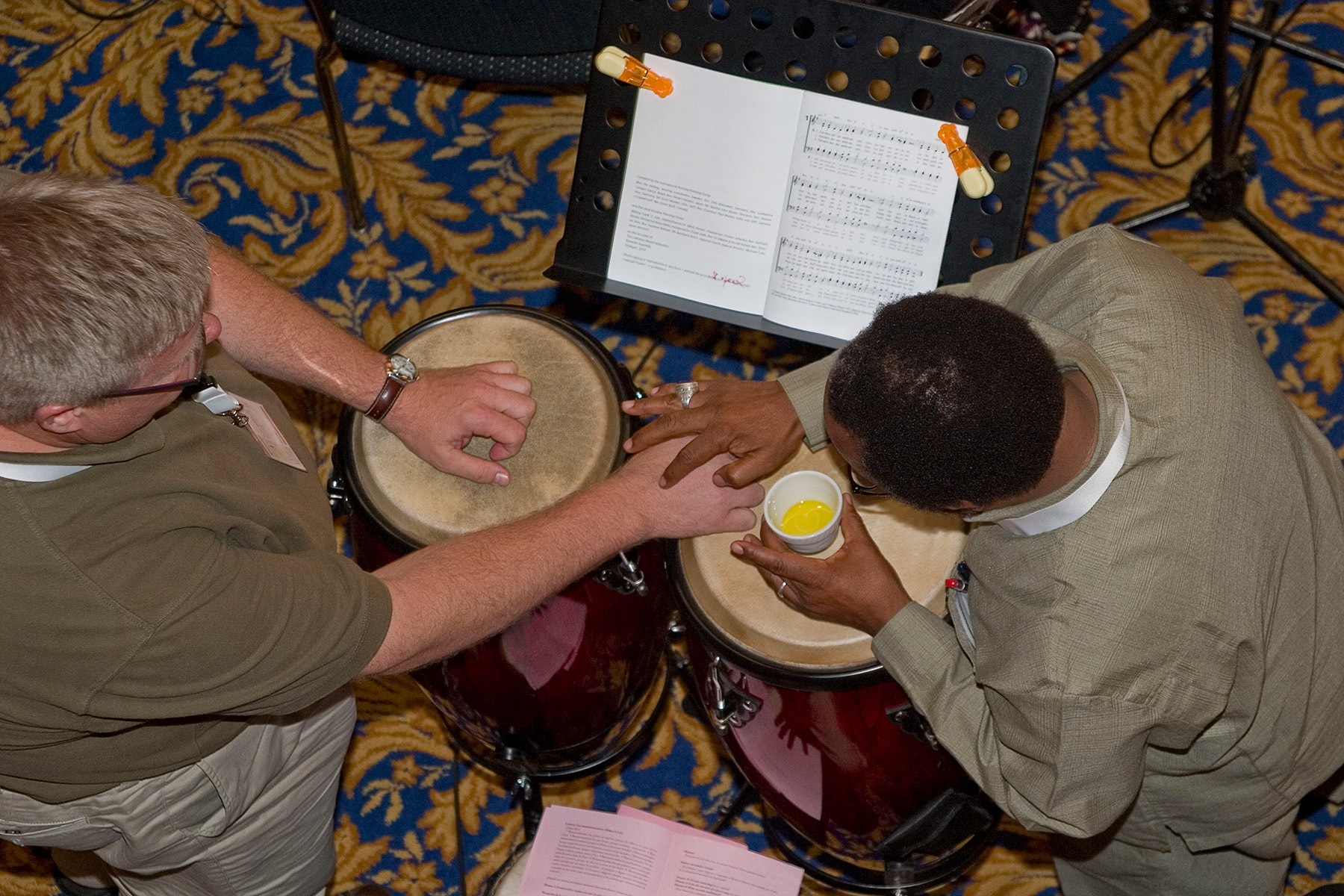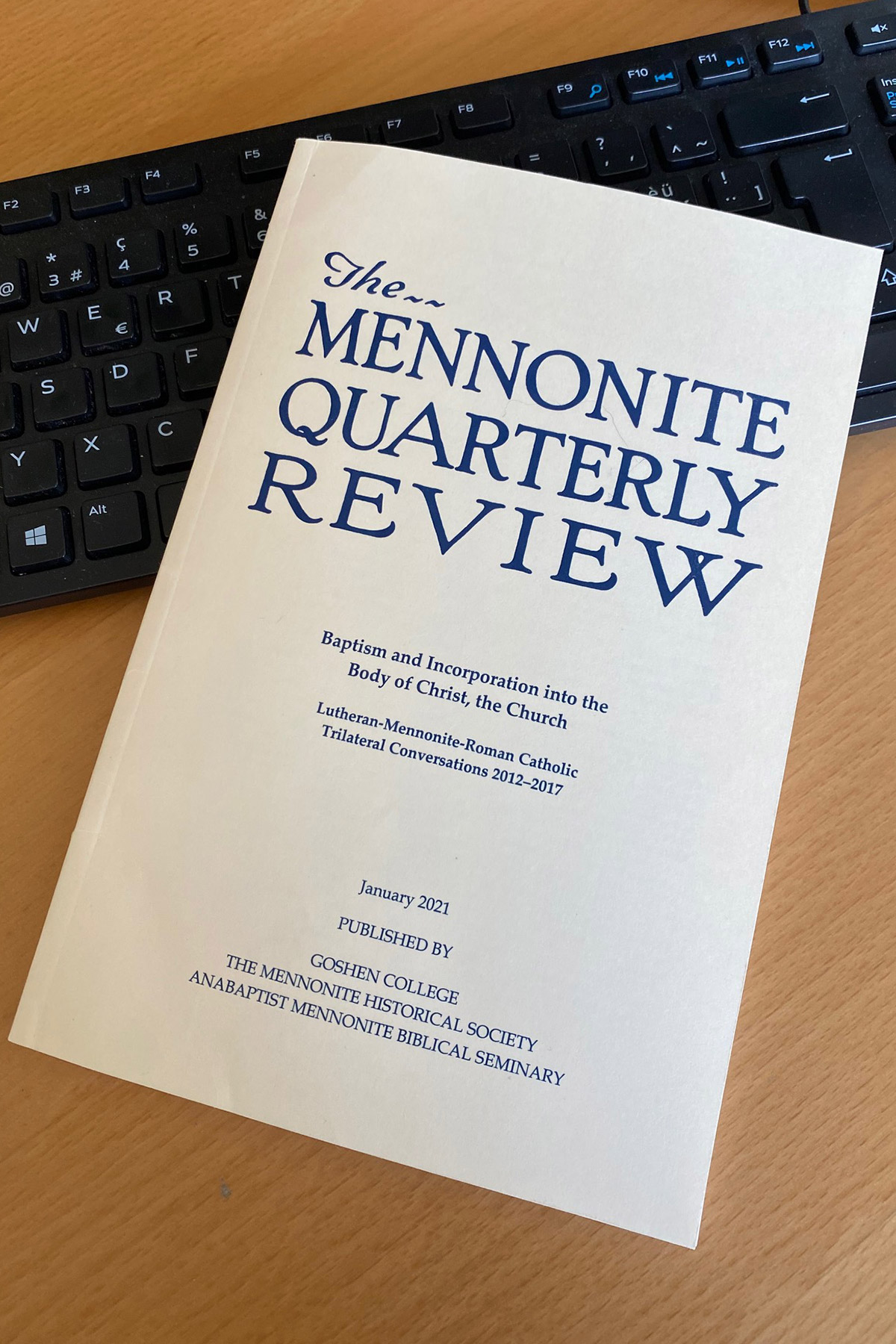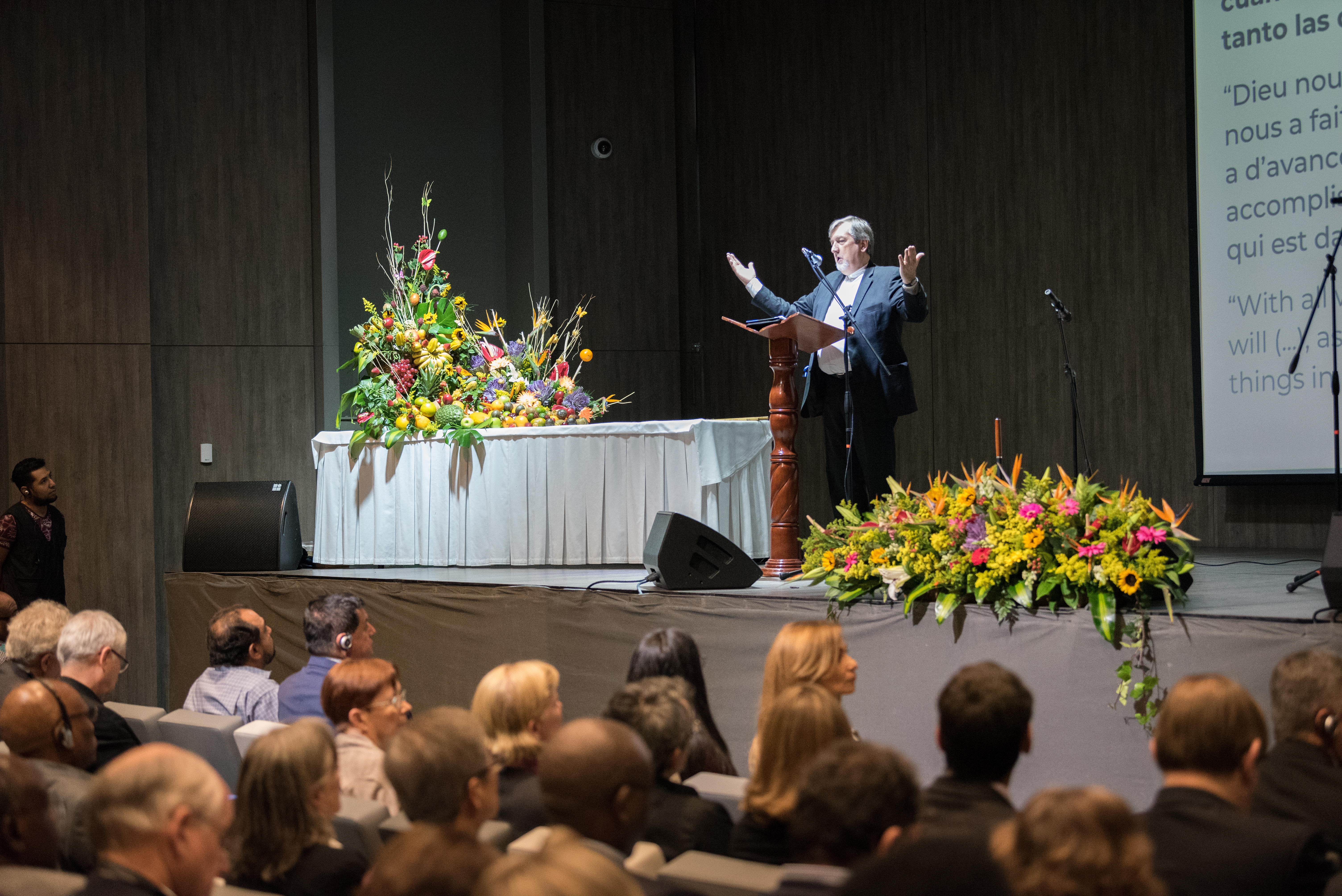
Rev. Larry Miller, as Secretary of the Global Christian Forum, addressing the Third Global Gathering in Bogotà , Colombia in 2018. All Photos: LWF/A.Hillert
Rev. Larry Miller on reconciliation, healing of memories, and the search for balance between doctrine and experience
(LWI) - Looking back on a career spent working for Christian unity, Rev. Dr Larry Miller speaks of the divided church as actual “wounds in the Body of Christ.” During Holy Week, the former General Secretary of the Mennonite World Conference reflects: “On Good Friday I think about us wounding Christ again” with those divisions and “I hope we can give him the joy of Easter by finding new life in the unity of the church.”
Raised in a Mennonite community in Indiana in the Midwestern United States, Miller had little contact with Christians from other churches until he attended university in the late 1960s. There, he not only met his future wife Eleanor, but he also took part in anti-war and anti-racism protests alongside Catholics, Protestants and other Christians committed to the peace and justice movement.
These new friendships led him to respond positively to a call from his church to travel to Europe to study theology and to undertake ministry in London, Paris and Strasbourg. Each of these experiences, he says, “challenged and expanded our vision of the church.” As Mennonites, that meant moving beyond the Anabaptist core “sense of identity” as a people born out of persecution by Catholic and Protestant churches in 16th century Europe.
Public apology and forgiveness
These grassroots experiences stood him in good stead when he was tapped to lead the Mennonite World Conference (MWC) in 1990, a time of profound changes in the shape of global Christianity. Not only did the fall of the Berlin wall lead to new ecumenical opportunities in the northern hemisphere, but the rapid growth of Evangelical, Independent and Pentecostal churches in the global south also meant a renewed focus on mission and evangelism in these ‘Spirit-led’ communities.
As leader of the MWC, Miller says one of his major challenges was convincing Mennonite churches around the world “to enter into conversations with other Christian world communions.” Mistrust of the Catholic Church ran deep, he recalls and there was “also a distrust of ecumenical conversation altogether.” Mennonites felt more “proximity to Lutherans, to Martin Luther and some of his perspectives,” he continues, but there was a prevailing sense that engagement was “probably worthwhile, primarily because Lutherans have something to learn from us.”

Lutheran and Mennonite participants at the LWF Assembly in Stuttgart, Germany, in 2010 anoint each other as a sign of repentance and forgiveness.
Two decades later, Miller was on hand to lead his church in the deeply moving moment of public forgiveness and reconciliation that took place during the Lutheran World Federation (LWF) Assembly in Stuttgart in 2010. It is hard to assess "to what extent locally or nationally [communities] have built upon that global interaction between the LWF and the MWC,” he reflects. But he is convinced that the “interface and LWF apology has had [….] a psychological impact on the Mennonite sense of being the victims” of history. “It's harder to think of yourself as a victim when the perpetrator, in one's own mind, comes and says please forgive us,” he adds.
Building trust for active engagement
After two decades at the helm of the MWC, Miller then served as Secretary of the Global Christian Forum from 2012 to 2018, playing a key role in broadening the basis for ecumenical engagement among “leaders who don’t usually sit at the same table and don’t know each other very well.” Established at the start of the new millennium, the first part of the Forum’s mandate, he notes, “is to be a safe space for building trust” among those church leaders, while the second “is to respond to common challenges together.”
A common challenge identified from the start of the Forum has been the problem of proselytism or ‘sheep-stealing,’ Miller says, as older churches may experience the conversion of Christians to younger, ‘Spirit-led’ churches, while those younger churches “sense that they are only doing what God is calling them to do.” Discussions on this question have not gone far enough, Miller believes, adding he hopes the Forum “can use the trust built to actually engage and go further in more difficult issues.”

Also available online, the Trilateral Lutheran, Mennonite, Roman Catholic Report on Baptism was published by the Mennonite Quarterly Review in January 2021.
Returning to the traditional dialogues with historic mainline churches, Miller reflects on the significance of the recently published report of the Trilateral Lutheran, Mennonite, Roman Catholic Commission on Baptism, previously one of the key dividing issues between those three Christian communions. While not unprecedented, the idea of a trilateral dialogue “felt unique at the time and worked well,” Miller says, adding that the interactions of participants “created a kind of mosaic which provided a richness that is not there with two partners, over and against each other.”
Receiving gifts, recognizing limits
Speaking of the follow-up to the report, Miller notes that “unlike anything previously, the MWC have decided to create a study guide for this,” due to be published and distributed to all member churches in the next few months. The goal is for the results and implications of that report “to be discussed as broadly as possible over the coming months” ahead of a forthcoming Assembly to be held in Indonesia in July 2022.
Working closely with Miller on the publication of the Trilateral Report, LWF’s Assistant General Secretary for Ecumenical Relations, Prof. Dirk Lange, shares the enthusiasm that it has generated around deepening mutual understanding of the sacrament of baptism and its implications for discipleship. "The Trilateral Report calls for widespread reception and implementation," he said.
Now retired and based back in the United States, Miller is prioritizing family commitments, as well as “exploring the world beyond the church that Ephesians (1:8-10) talks about” in terms of a “cosmic unity that is so much bigger than the unity of the church.” Reflecting on the future of the ecumenical journey, he longs for a ‘radical catholicity’ that includes all Christian communities and uses the model of ‘receptive ecumenism’ to receive “the gifts that [other churches] have to give to me.”

Rev. Larry Miller leads a plenary session during the Third Global Gathering of the Global Christian Forum in Bogotà, Colombia in 2018.
“If we can recognize our own limitations and the reality of multiple gifts in all those churches,” Miller says, it may be possible to overcome the current divisions between a classic doctrinal dialogue focus and the more “experiential approach” prefered in many younger churches. Both doctrine and experience are “essential but not adequate,” he concludes, asking “if and when will we be able to bring these two sources of revelation into a balance to find fulness in our understanding, our experience and our convictions?”
LWF/P. Hitchen
Ecumenical Perspectives: The LWF engages in bilateral, trilateral and multilateral dialogues and practical cooperation with many other Christian churches and world communions. In this series we profile some of those ecumenical partnerships, highlighting past progress and current challenges on the road towards full Christian unity.


